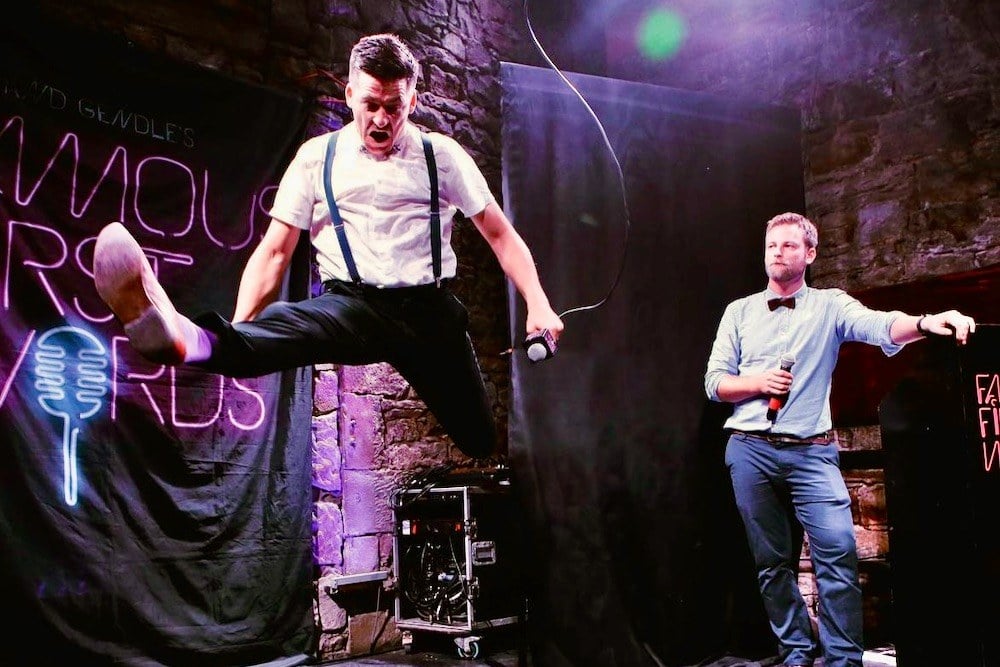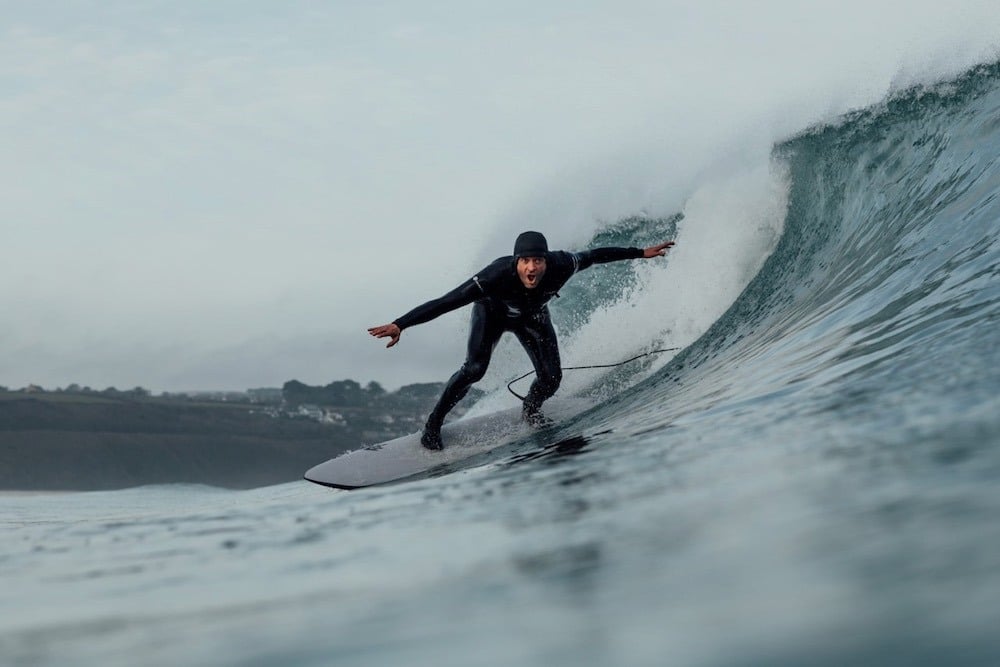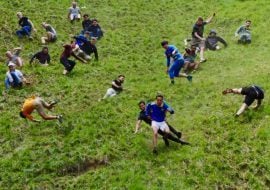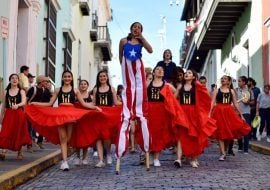Wisdom of Ageism: Chip Conley
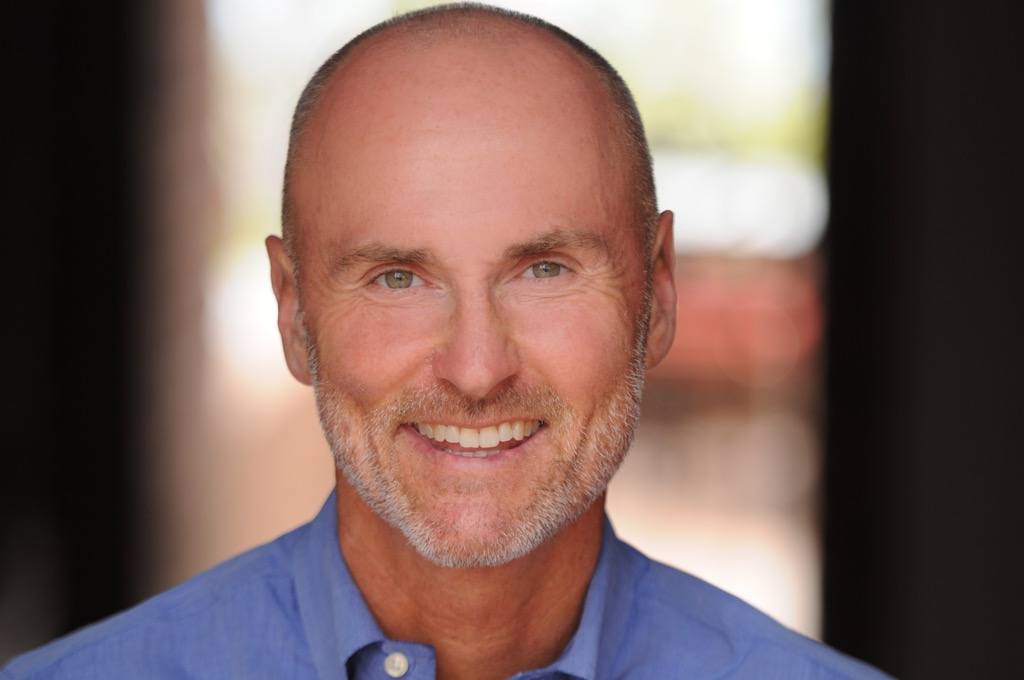

Episode 13: Podcast with Chip Conley, American Hospitality & Leadership Advisor and Modern Elder Academy Founder
In this episode Oli Russell-Cowan chats to Chip Conley who helped Airbnb’s founders become a global hospitality brand. Airbnb hired him as a teacher and mentor for his hospitality experience running Joie de Vivre Hospitality (JdV) for 24 years. Chip transformed an inner-city motel into the second largest boutique hotel brand in America. At Airbnb Chip reported to a CEO young enough to be his son and most other employees were half his age. He succeeded by combining his wisdom and experience of the hospitality industry with the curiosity to learn about new technology. This experience led Chip to write New York Times bestseller Wisdom@Work: The Making of a Modern Elder and start his new company, the Modern Elder Academy: the world’s first “midlife wisdom school”.
Tune in for some of his best stories about learning to surf at age 58, mentoring six young CEO founders in the hospitality/tech world, his time on the board for Burning Man and founding Fest300.
Listen to the podcast:
Dive in and listen to this episode on Apple Podcasts and Spotify.
Read the transcript:
Oli Russell-Cowan: Hi guys, it’s Oli from Rad Season. I’m excited today to be joined by Chip Conley, who is the strategic advisor to Airbnb. He’s also the founder of Modern Elder Academy.
Chip. Thanks for coming on the show.
Chip Conley: It’s great to be here. Thank you.
Oli: Whereabouts are you at the moment?
Chip: I’m in the southern Baja Peninsula in Mexico, so just below California. There is a long strip of land that goes from San Diego all the way to Cabo San Lucas, and I’m down near the bottom of that peninsula where our Modern Elder Academy MEA is located.
Oli: What’s the situation like over there at the moment?
Chip: It’s actually relatively safe. Mexico would definitely have had major outbreaks, but the peninsula is almost like an island. So we haven’t had serious problems. But we do get a lot of Americans coming down here and so the American problem is a little bit of a Mexico problem as a result.
We had to close in March and we reopen in October. It’s been fascinating to see all of this happen in five months staying in place here in this rural fishing and farming village on the beach. There are many days where I don’t look at any social media or any media at all. I wouldn’t know that there was a problem in the world. If I go into town here in town, everybody has masks on right, but we’re in nature so you don’t notice it.
Hospitality

Oli: Well, that’s good. I guess I’d love to take it back to where you got into hospitality. How did that all begin?
Chip: When I was 26 years old. I’d spent the prior few years learning how to become a commercial real estate developer and I was fascinated by hotels. I didn’t have any background in it. I’d never gone to a hotel school. I was trying to convince the owner, the president and CEO of our company to create a hotel division that I would be running at age 25 or 26. He laughed at me and so instead I decided to start my own company. I didn’t have a lot of money. So I bought a broken down motel, a pay by the hour motel in a bad neighborhood in San Francisco and I learned the business. I called the company Joie de Vive which means joy of life in French.
We went on to create 52 boutique hotels over the next 24 years while I was the founder and CEO of that company before I sold it. It’s now a Hyatt brand. That was 10 years ago that I sold it.
The Importance of Business Culture

Oli: Being pretty young at the time, 25 and starting that off, how did you grow it from the first motel and then expanding from there?
Chip: You know, what was interesting to me was that I had certain areas where I had a natural talent and others I just didn’t. Where I had a natural talent was in the conception and the creation of the boutique hotels, each with its own identity and brand, name, personality and design. So I was pretty good at that. I put together a great team there. We had our own in house interior design, in house branding, etc.
Where I wasn’t as good as was the operation side. I didn’t have any background in hotels. Running a hotel is like a marathon, definitely not a 100-meter dash. So bringing together a team of people and then creating a culture.
‘I’’m just a huge believer in the importance of culture as a strategic differentiator for a company.’
So I studied some companies that I thought had great cultures, I went out and talked to the CEOs of those companies as this young guy just saying, hey, I want to learn how you created a great culture.
Fortunately, I was able to create a great culture for my company. We had 3,500 employees and we won all kinds of awards for culture.
‘The culture is the thing that actually keeps your organization in a good place at a difficult time.’
So it’s a very relevant subject right now, given how difficult the times are in many industries, especially in the industry that I know best, which is travel and hospitality.
Oli: Would you say that culture is surrounding yourself and bring on the right team that would build that culture or would fit into your vision?
Chip: It’s definitely I think a very democratic process. I don’t think it’s like just Chip making the decisions. The best way to describe it is if I were to ask you Oli, what’s your personality and you came up with five adjectives to describe your personality, let’s say aspirational. They might be different aspirations than what they are, who you are. That would be what a great company would do. They would say, what is our brand? What’s our culture. What are the five adjectives to aspirational, define that.
Then if we were going to go out and ask our customers or employees, what are the five adjectives that define us? What would they say? Then you look at the disparity, and you start asking the question, what’s the bridge that’s gonna get you from where you are to where you want to be, in terms of those qualities. You start to develop programs and even leadership habits that help the leaders and in line top-level people to live into that. So for our company, we were a funky, creative, humble company that was sort of a little bit quirky in how we lived and operated.
‘Once you have a culture, that’s clear, you create an environment where people are attracted to it and you end up attracting people who appreciate that culture.’
I wrote a lot about this in a book called Peak about how great companies get their Mojo from Maslow. If someone wants to learn more about my perspective on culture and why my company won a lot of awards on culture read that book.
Actually that’s the book that led me to join Airbnb because the founders of Airbnb, in their early days, had read my book Peak and they said, We want this company, our company Airbnb to be as culture focused as Chip’s company was. So they reached out to me and said, Will you join us and help us democratize hospitality?
Oli: 24 years you were running the company after that, did you just think, Okay, you know what, I can retire now I don’t really need to work. What were you thinking at the time or you wanted to do something different?
Chip: There’s a famous movie called the Intern with Robert De Niro and Anne Hathaway and it’s sort of a popular movie. In the movie, De Niro says, ‘musicians don’t retire they quit when there’s no more music left inside of them.’ So I knew I didn’t want to retire. I knew I had music left inside of me. I just wasn’t sure who to share it with.
Fest300: The Best 300 Festivals in the World
Chip: Before Airbnb came along I started working on this festival idea. This Fest300 idea. Do you want me to talk about that?
Oli: That’d be great. Yeah.
Chip: So I had a long fascination with festivals. I was one of the founding members of the Burning Man board for those who know the Burning Man festival. I’d been going to Burning Man for 20 years at that point. I’ve gone to a lot of other festivals too. I was 49, 50 years old and I was curious about the fact that there are festival communities that have developed, but there wasn’t a particular website that I felt was the best website in the world. This was eight or nine years ago that I was looking into this.
The website allowed you to discover the festivals you wanted to go to. And my interest in festivals was not specific to transformational festivals like Burning Man or music festivals. But it was everything from religious pilgrimages to film festivals, food festivals, arts and cultural festivals, etc.
So what I was intrigued by was the fact that,
‘The more digital we got, the more ritual we seem to need and the ritual was in the form of a festival.’
So I put together a team of festival fanatics and we created a website called Fest300 with the intent of creating an annual list of the 300 best festivals in the world. So in the business world, there’s a Fortune 500 lists and a Forbes 400 List of the 400 richest people but there was no festival list. So we created a Fest 300 list.
For a few years there we had an annual list and one year, I went to 36 festivals in 20 countries. Then ultimately we merged it with a company called Everfest. But you know, to be quite frank the business model for all of that was difficult. Along the way very early into me launching that business that’s when the Airbnb founders came along and I had to go leap into that and I really couldn’t run the business. So I had to have my partner run the business.
Favorite Quirky Festivals

Oli: When you were running it, were there any standout festivals? You covering all these different things like food and cultural events, music, but is there any standout, like the quickest festivals?
Chip: The quirkiest festivals. I’ve gone to a bunch of them.
You live in Portugal Oli, near Spain. I think the three countries in the world that have the most robust festival cultures are:
1. India’s number one
2. Spain is number two
3. and surprisingly, Japan is number three
El Colacho Baby Jumping Festival

So when it comes to Spain, Spain has a lot of quirky festivals. One of my favorite quirkiest festivals of all time is El Colacho, which is a festival most people in Spain have never heard or don’t know about. It’s near Burgos, Spain. It’s a festival that’s going on for 400 years in a row in a tiny village of 500 people. But it covers a 50 square kilometer area. Any child that has been born in the last year gets laid out on a mattress that goes through the town.
‘These two guys dressed like devils who are drinking all day. They drink and then they jump over these mattresses full of babies.’
There’s a Scottish Bagpiper and there’s a Catholic priest because it’s a pagan Catholic festival. It’s the weirdest thing I’ve ever seen. But I loved it because it was sort of like being in a Fellini movie or some weird surreal film on mushrooms, because you had everybody from the 85-year-old Deacon of the church, to obviously the one-year-olds. You had this weird mix of people and then maybe a total of about 50 spectators, of which I was one of them. So that’s El Colacho, that’s a strange festival.
There’s also a festival in Spain, the pilgrimage of the Near-Death Experience. Anybody who’s ever had an N D, which is basically going to the other side and coming back and I am one of those people, which happened to me when I was 47 years old. It’s basically people being put in coffins, open coffins and being carried through the streets of this northwest Spanish city, not too far from Portugal. You’re opening yourself up to still being alive. Spain has a lot of weird festivals. Like La Tomatina, the tomato throwing festival.
My favorite festivals, I would say if I had a top 3 to 5:
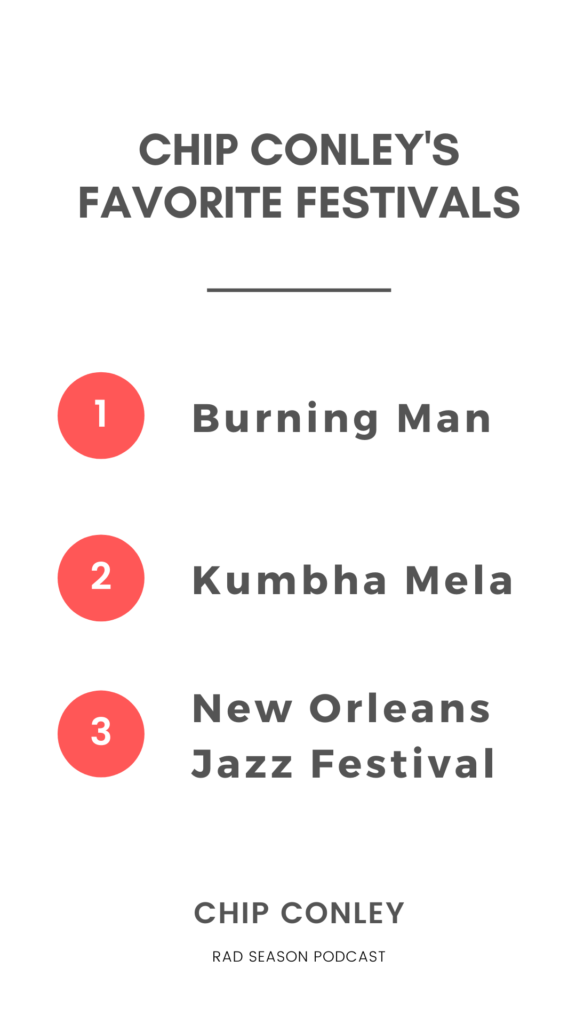
i) Burning Man is obviously one of those.
ii) Kumbha Mela, which has 100 million people during the festival. It’s 55 days long every 12 years, every three years they do a smaller one with 40 million people. It’s at the Ganges River in India. It’s the largest gathering of humanity ever. That was fascinating. That was like Burning Man on steroids because it’s basically these little camps with Hindu gurus in charge of each camp.
iii) I love the New Orleans Jazz Festival, because it’s such an interesting community experience of how it just taps into New Orleans.
iv) I love Il Palio which happens twice each summer in Sienna Italy, which is basically like a medieval, bareback horseback race through the streets of Sienna.
There are just so many! Of course, then there’s Boom in Portugal. There’s Secret Garden which used to be a really big thing in England and not as much as it used to be today, I would say.
It’s a tough and very difficult business to be in. If my company Fest300 had survived and been a successful website for festivals, it would no longer have survived at this point. It’s really sad to see the festival culture not in a place where they can live in the real life world.
Oli: It’s going be interesting what happens later in the year and the next year to see where it goes. A lot of these festivals have been going for hundreds of years., especially some of the quirky ones and the strange ones.
Chip: Those ones, the ones that have been going on for a long time and don’t necessarily have a financial or commercial reason for being are more likely to last than the ones that are built on an infrastructure of sponsorships and things like that.
Burning Man
Oli: Are you still involved with Burning Man?
Chip: I stepped away from the board about a year ago but I’m still pretty involved in certain ways. I helped buy the fly ranch property, which is 10 miles away from the Burning Man site, which is really the long term site for what Burning Man is going to do. I’m still moderately evolved in.
It certainly introduced me to festival producers and aficionados all over the world because they would come to Burning Man and I was in first camp, which is where the founders camp was and I was a founding board member and I was probably the most active board member. I still am the mentor to the CEO, Marian Goodell.
It’s been a great experience. I’m definitely less active than I used to be.
Starting at Airbnb

Oli: After Fest300, and you being approached by the founders of Airbnb, what was your position and what was the intention there?
Chip: The three founders of Airbnb had a small tech startup. At that point, it moved to being called Air Bed and Breakfast to Airbnb and it was growing fast. So before I got there it was growing fast. I didn’t have much to do with having it in the early days, get some growth trajectory, but it was still a very much niche business it was oriented toward millennials on budget travel in the top 20 urban markets in the world.
So I came along as the only person in the company with a travel industry or hospitality background, the only person who had an entrepreneurship background beyond tech.
Brian, the co founder and CEO said I want you to be my in house mentor. And so, for four full time years, I was the Head of Global Hospitality and Strategy, which meant I was in charge of all the hosts globally. I was in charge of strategy for the company, I was in charge of business development, business travel, learning and development, landlord partnerships, you name it. It was great.
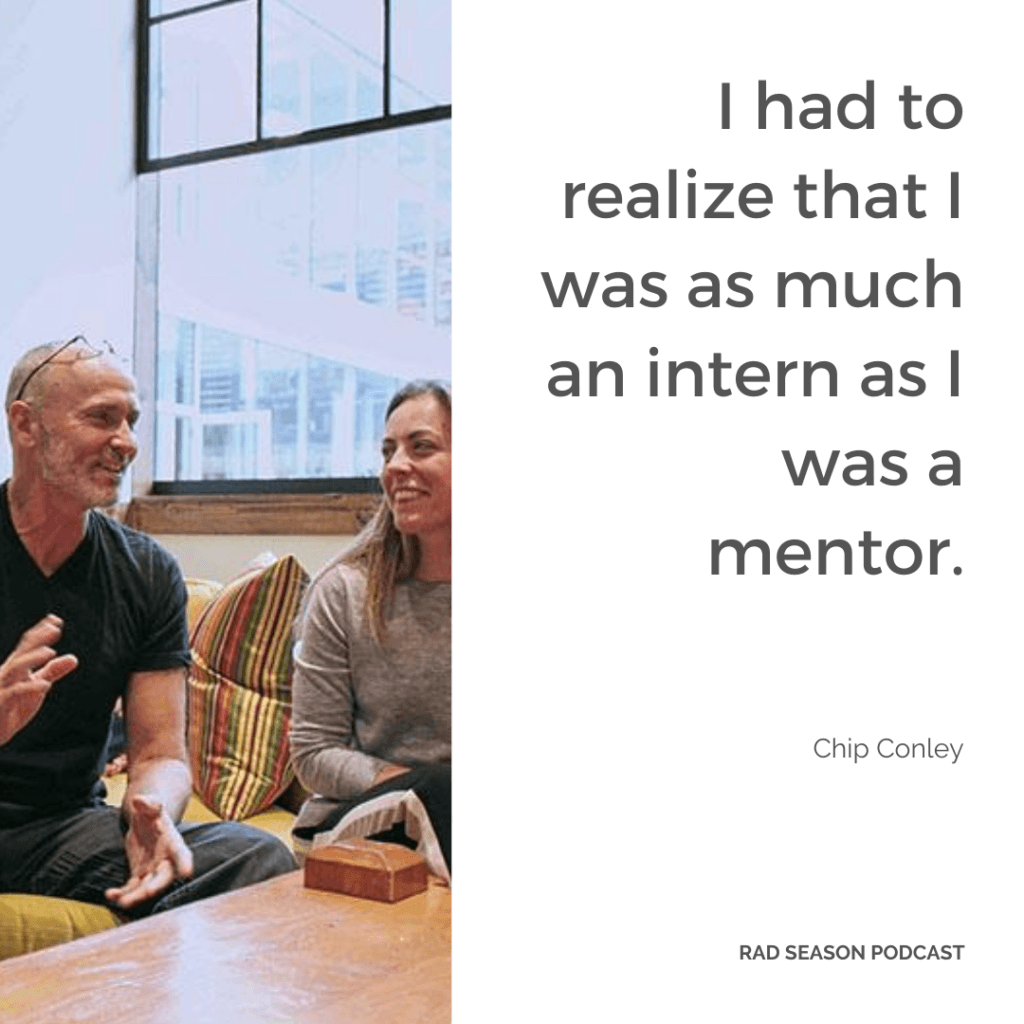
Because I’d never worked in a tech company before. I was 52 years old and had spent pretty much my whole career in real estate development/hospitality and didn’t know a damn thing about the tech world. So I learned as much from Brian even though he was my mentee as he did for me, but he was also my boss. He was 21 years younger than me and he was my boss because he was the CEO. So it was a fascinating experience as well.
Wisdom at Work
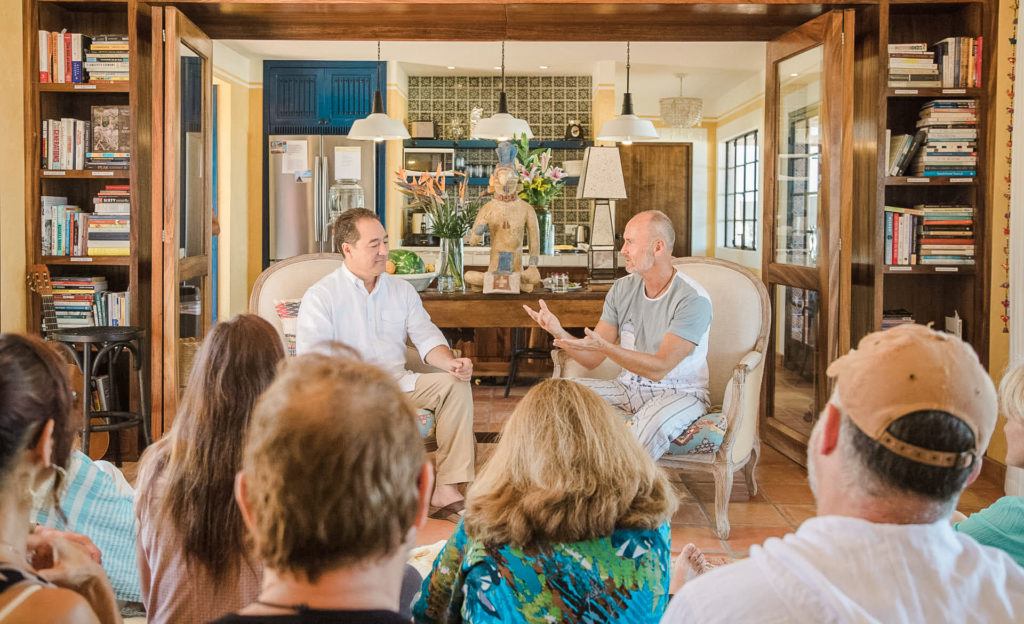
They started calling me the modern elder in the company who’s as curious as they are wise. That’s really when I started to realize, Okay, wow,
‘We have a world where we’re going to live longer. Power seems to be moving younger and the world is changing faster.’
Those three variables have a lot of people in midlife pretty confused and bewildered and maybe feeling irrelevant. That’s what ultimately led me to writing my most recent book, I wrote my fifth book called Wisdom at Work: the making up a modern elder.
Initially when I heard them call me modern elder, I was like, you know, Fuck you, I don’t want to be a modern elder.
Excuse me, but I was like, I don’t want to be called the modern elder that’s like a really old person. But the difference between elderly and elder is the following: Elderly is the last five or 10 years of your life no matter who you’re surrounded by. But when you’re an elder, it has nothing to do with your your age it has everything to do with who you’re surrounded by compared to your age. So it’s a relative term.
So in the world of Airbnb, where I was twice the age of the average employee, I was an elder, even though I wasn’t elderly. I own my modern elder hood and ultimately for three and a half years now I’ve been an advisor, but for four years really deeply enmeshed in how I helped the founders and our leadership team steer the rocket ship during a time of very rapid growth. And also during a time when we were a controversial company, especially in my home industry hospitality.
You can imagine it’s like I had people say to me, first of all, I had people say to me, ‘why would you ever join that company?’
First of all, they said to me, I’ve never heard of that company. What the hell do they do? Then they heard what it did. They were like why would anybody join that company, that sounds like a stupid idea. And then thirdly, a year or two later there were like, we hate you Airbnb sucks.
Airbnb Bouncing Back
Then a year later, I start getting their resumes. They realized we were onto something. What’s been really interesting Oli is that in this pandemic, everybody in travel, everybody in lodging and accommodations, you know, hotels, hospitality, everybody’s gotten devastated. But what’s really fascinating right now is how fast Airbnb has recovered.
Airbnb’s weekly booking for the last three or four weeks has been equal to what it was a year ago. Marriot has not even been close. And that’s partly because that people are seeking safe spaces, where they can go in and clean it themselves. They don’t need to have a maid. They want a lot of space, less money. And they want to be, frankly, outside the cities. So long story short is it’s really interesting to see Airbnb recovering like it is.
I’m proud of Brian, who’s almost like my son, in terms of how he has managed through a very difficult time.
Oli: Is that mostly coming from domestic travel or is that international as well?
Chip: Yeah, it’s mostly domestic. Obviously, in Europe people cross borders a lot more than they do in the United States. But it is definitely more US, it’s more people within 300 miles of their home.
People are staying longer. So instead of people doing a four day trip, they’re doing a four week trip, you know, and they’re saying I’m decamping from my home. I am, we, as a family are going to go and live, you know, out there in the Black Forest. So it’s been fascinating.
Airbnb at Festivals
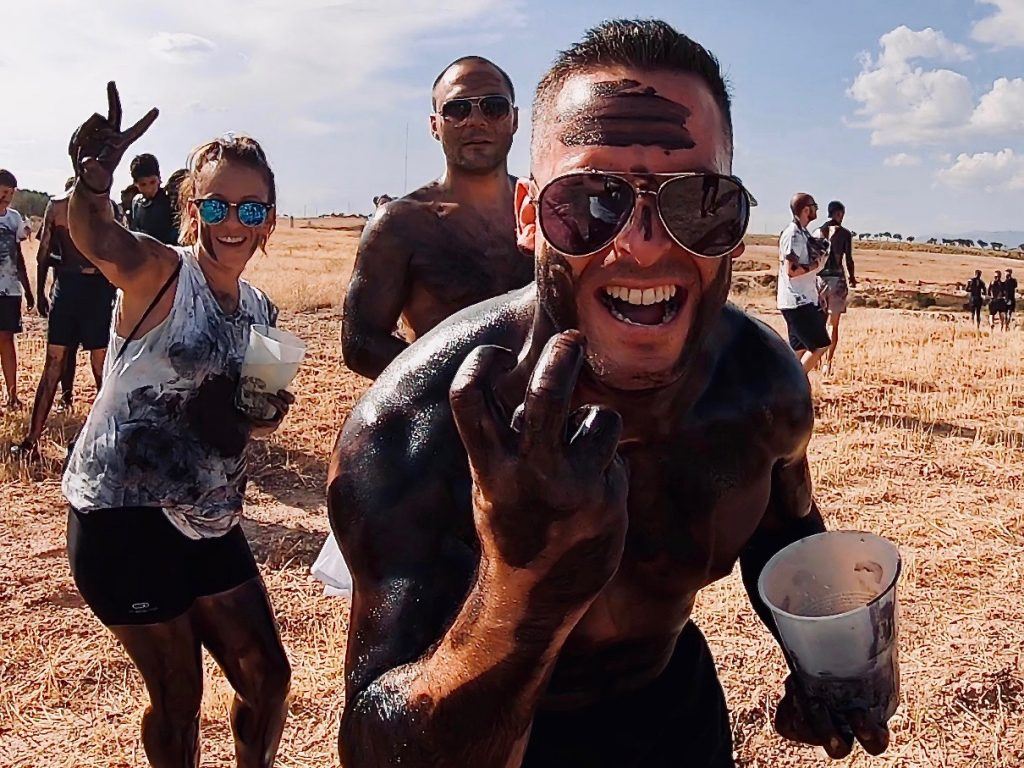
Cascamorras, Spain
What was interesting for me in my early days at Airbnb is my festival background was really well suited for Airbnb. I was able to make a lot of connections in the festival world with Airbnb because when there’s a festival happening in a place, it often creates a housing or not just a housing shortage, but hotel/lodging shortage.
So we needed to figure out how to address that supply need as well as all the regulatory needs that you know Airbnb needed to start to focus on in the communities in which people were renting their homes.
Oli: It’s a good fit. I went traveling with my family around Europe last summer, we went to 25 festivals and we were using Airbnb the majority of time. I’ve got a two year old and I was thinking okay, we could camp with him and my wife at some of these festivals or we could just go get an Airbnb down the road.
If you could afford it. Obviously, camping is probably cheaper, but it’s certainly a little easier.
So what are your top three or four festivals from from that sojourn?
Oli: So from that trip, last year, we went to this trumpet festival in Serbia called Guca.
That was wild. It was in this village in the middle of nowhere and every August for three days, they get all the trumpet players from across the Balkans and within Serbia, they go there and they just have this massive party!
They have a big trumpet competition at the end. I’ve never heard anything like it. That was that was pretty good.
We went to an incredible one in Spain called Cascamorras which is where they get covered in oil. That’s on two separate days, around religion like a lot of these Spanish festivals.
Chip: Did you ever go to the tower one where the people are building these human towers?
Oli: We were going to go. The initial plan in January was to go to one festival a month and just drive to them over from Portugal.
I was looking at Colcacho, Baby Jumping Festival.
Chip: Yes, you’re one of the few people who knows it exists.
Oli: It looks too crazy to actually be true. I want to see it for myself.
Chip: Another one you should go to is the Cheese Roll in England.
Oli: We went to that as well.
Chip: Oh, I love it. it’s on Copper’s Hill. That’s a scary one. Oh my god. I saw a guy dislocate his leg.
Oli: Did you do it?
Chip: You know, I actually ran up the hill. After I ran up the hill, I was like, I’m not running down the hill. No, I walked down the hill. But Dude at that time I was 53 years old. I was like, I don’t think so. I don’t think so.
Oli: It’s pretty steep, isn’t it? I remember walking through the fields and seeing the hill.
Chip: It’s actually not that steep, it’s the moguls, it’s not seeing the dips that makes it crazy.
So worth watching a video of that if you know those who are listening, or watching want to go and find just, it’s called the Cooper’s Hill Cheese Roll in Gloucestershire, England.
Oli: This year it wasn’t on with COVID. They did do a sort of ceremonial cheese roll. One person actually goes up there and rolls the cheese. He went up there and he rolled the cheese down with no people watching.
I couldn’t believe there’s like a couple of thousand people on the hill watching. I was taking photos right at the bottom and trying to dodge the people and the cheese.
Chip: You didn’t go down?
Oli: I didn’t no. It was the first event of the 25. I saw videos before and I was like, no.
Chip: If it’s the first you don’t want to like mess it up so that you can’t go anywhere else.
Have you been to Boom?
Oli: I haven’t no.
Chip: Okay. So that’s what I think of when I think of Portugal.
Oli: There’s so many. It’s kind of endless. When I go to one I then discover another one. There’s one in Wales called the Bog Snorkelling World Championships.
Chip: Yes, I know. I’ve not been but I’ve read about it.
Oli: That was pretty fun. I took part in that with a couple hundred people there.
That was wild. It’s in a bog in a field in Wales in the middle of nowhere and it has a really good community feel and everyone’s just having a good time. Half the people there are competing and trying to do a fast time the other half are in fancy dress and they get a prize for the wackiest fancy dress. It was good.
Modern Elder Academy
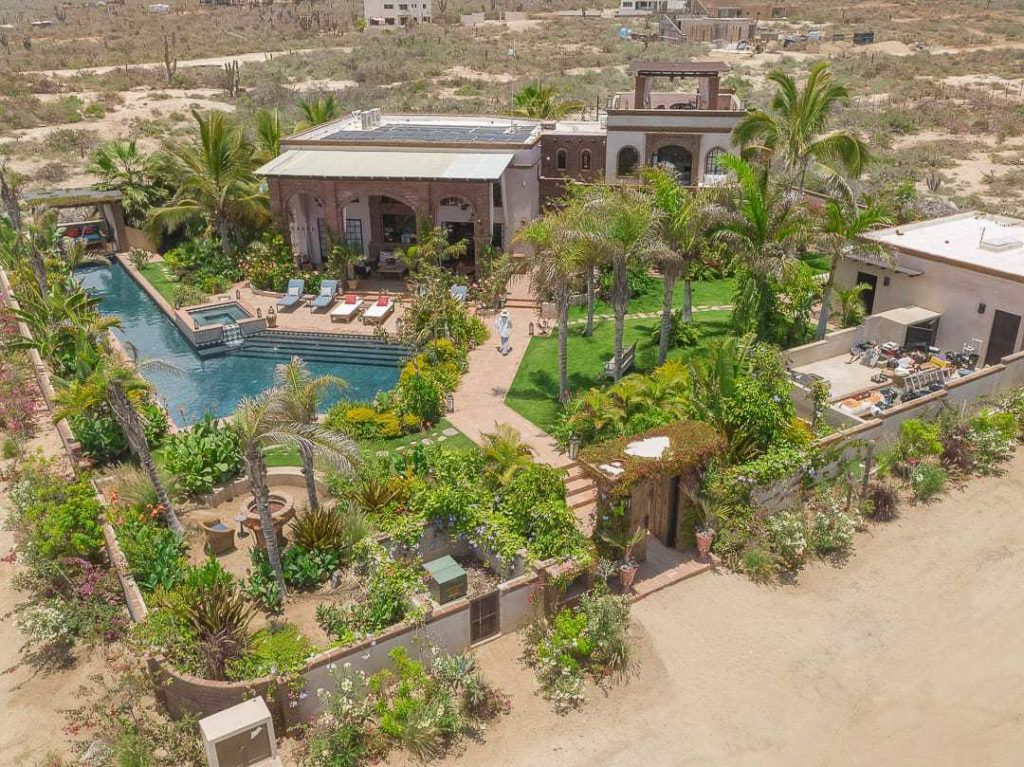
MEA Campus in Mexico
So now with the Modern Elder Academy, what are you you doing there? What’s happening?
Chip: When I left a full time role at Airbnb, I started writing my book. I live part time down here in Mexico and I have a home on the beach. One day I went for a run on the beach when I was running, I had this idea.
‘Why is there not a school or academy for people in midlife to help them to mind their mastery and repurpose themselves for the second half of their adult life?’
It was a fascinating thought. Okay, let’s create the world’s first midlife wisdom school. And so within six months, I built the campus it all happened very quickly. We started in the first half of 2013.
The Modern Elder Academy with 153 people going through the program, either one week or two week program in cohorts.
We got really good feedback about it. That led me to making the decision that I think we should do this full time and make it a program open to the public. So it opened in November 2018. We had 750 people from 24 countries go through it. The basic premise is this. We go through all kinds of transitions in midlife and I define midlife quite broadly 35 to 75. So Oli I don’t know if you’re quite midlife yet.
Oli: I’m 38.
Chip: Ok, so your in midlife, your there. We had people from as young as 30 and as old as 88, but 35 to 75 is what I consider midlife, which is a very broad perspective of midlife.
What we’ve really been able to see is that people have come here and learned how to navigate the transitions that people have in their midlife. Whether that’s at some point you’ll be an empty nester your son will leave and your’ll have an empty nest at some point. You’ll have your parents pass away, you’ll, you’ll change your career. All kinds of things happen in midlife.
So what we are seeing is that people don’t really have much in the way of schools, tools or support to help them through what’s next for them, not just in their career, but just in life. So, yes, we’re closed right now, because of the pandemic but we reopened in October.
Half the people who come are on some form of scholarship we give them because we believe deeply that wisdom is not taught, it’s shared. So having a really diverse cohort of 18 people together, from all over the world with all kinds of backgrounds really enriches the sense of cultivating and harvesting wisdom.
“I like being a pioneer, you know, as a boutique hotel pioneer, I was a home sharing pioneer and now I’m a wisdom school pioneer.”
It’s been very gratifying.
Learning New Things
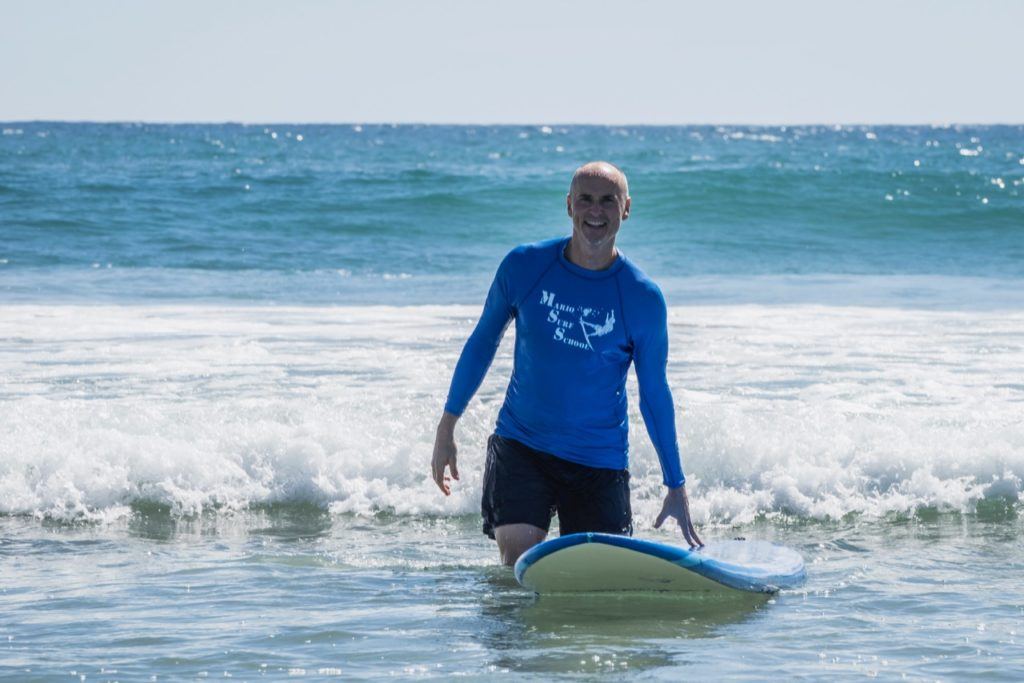
Chip Conley learning to surfing. Photo credit: Nina Dietzel
Oli: I’ve heard you’re learning Spanish and learning how to surf if that right?
Chip: Yes. So one of the things that we really help people to see is how much of their adult life is still ahead of them.
I have a quick story here, which is my dad and I go scuba diving. My dad is 83 later this summer and and he’s been scuba diving since he’s 60. He’s now done 2800 dives around the world. So he’s a very avid scuba diver. I became a scuba diver in my mid to late 50s. And we were scuba diving in Indonesia a couple years ago. I went on one of these online websites to try to actually figure out how long I was going to live. It’s like a longevity site. I put all my inputs in and it said I was going to live till age 98.
So my dad and I are going off to go scuba diving for the morning. On the boat, I said to my dad, ‘how long are you going to live Dad?’ I didn’t tell him what I’d done. I didn’t tell him I did the survey. And he said, ‘ah Chip, I’m going to live until I’m 98’. And I said, Well, that’s interesting. I just found out I’m going to live until I’m 98. Then my dad said, let’s do the math and this is really interesting.
Let’s do the math. And my dad said, Listen, if I’m now if I’m 80, and I’m gonna live till 98 I have just entered the fourth quarter of my adult life if I start counting at age 18.
So, and for me, I was 57 at that time. I was not even at half time yet if I was going to live till 98. I was not even halfway through my adult life of 80 years, if you go from age 18 to 98. We are not reinforced by society to try new things after about age 45.
‘Here I was at age 57 realising I’m not even halfway through my adult life. So why not take up Spanish or surfing?’
One of the questions I think we need to ask ourselves constantly is, ‘What do we know now that we wish we knew 10 years ago?’.
Okay, you’ll come up with that answer. That’s an interesting, provocative question, huh? Now, take that question and apply it to your next 10 years. What is it 10 years from now that you wish you had learned now? Think 10 years from now? What could you say to yourself 10 years from now that you wish you’d learn today? And then why don’t you start learning it today?
For me, Spanish was a real obvious one because I live in Mexico a lot of the time. I learned French like Joie de Vivre being the name of my company. So, learning Spanish makes sense. Okay. That was obvious. Surfings less obvious. But I live on a surfing beach. I’m 59 now if I don’t learn now learning at 69 it’s gonna be harder than learning at 59.
If there’s a lesson to all of this, it’s to have fun. One other thought. Part of the reason I got fascinated by festivals is I’ve spent my last 10 years believing in a guy called Peter Drucker. Peter Drucker passed away a few years ago, in his mid 90s. But he is the most famous management theorist in history. He wrote two thirds of his 40 books after the age of 65. He believed down to his toes the following,
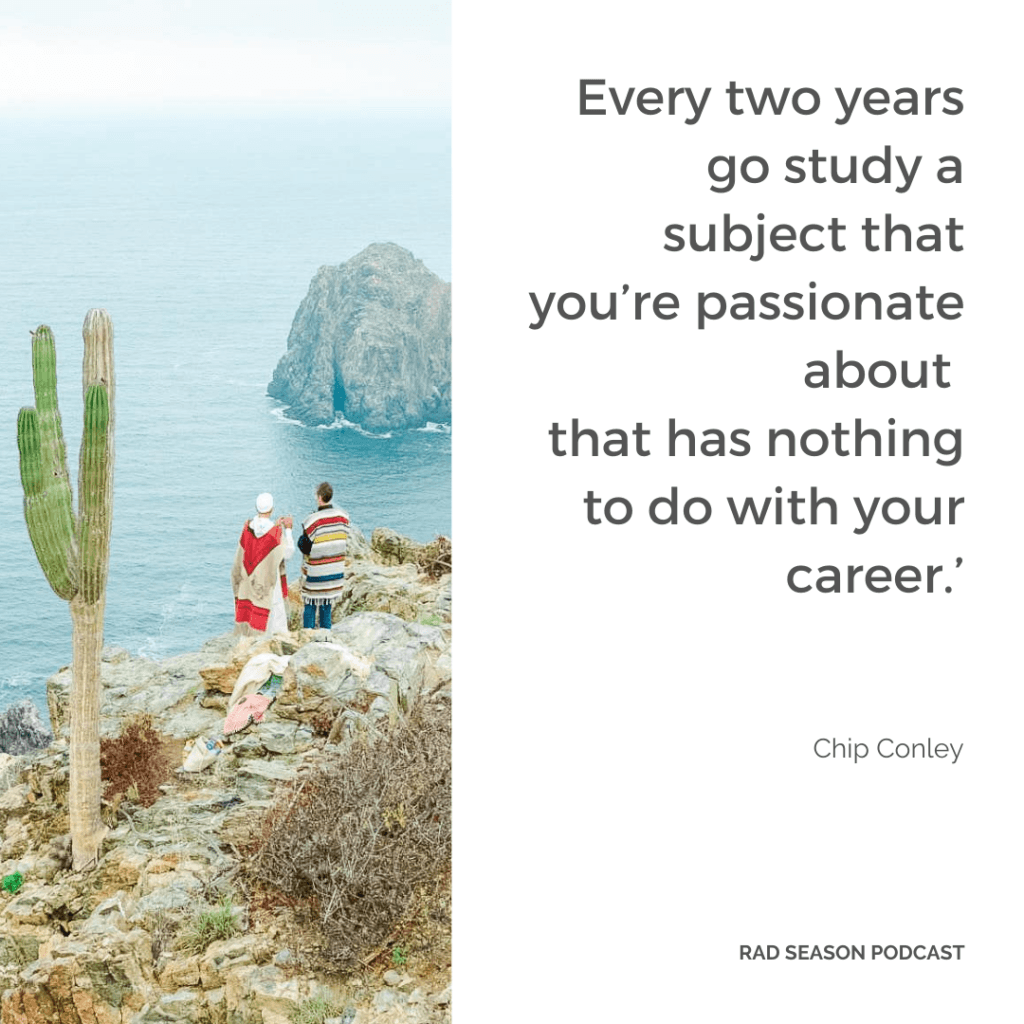
Will it serve your curiosity it will serve as an elixir for life.
So every two years I find a subject whether it’s festivals or emotions, or the subject of aging, that has nothing to do with my career. Sometimes it leads to me creating a company like Fest300 or writing a book or starting an academy. I don’t do it for that.
I studied hot springs a few years ago. Well, that didn’t turn into anything other than the fact that I love hot springs even more and I’m a hot springs aficionado.
‘That process of learning and getting curious is a really valuable way to stay fresh in your life’
Oli: Yeah, I completely agree. II’m a keen surfer. I’ve been surfing ever since I was 18. I first started then and would try and go as much as I could. Then the pandemic happened and they ban surfing in Portugal. You couldn’t go in the sea then so I picked up the mountain bike again and then got really into that.
I’m not great at either, but it’s just good to learn and try and do something new. I studied Spanish in University and now we live in Portugal. I’ve got to learn Portuguese. That’s next.
Chip: What are the distinguishing features of Portugal versus Spain?
Oli: When we first moved to Portugal I had been going to Spain ever since I was a baby. My dad’s business was over there. So we’re kind of going regularly from the UK. I spent quite a bit of time in Spain and didn’t know much about Portugal just thought okay you know it’s the strip next to Spain. Quite a bit smaller but there’s so much going for it completely own separate cultural and identity. The people have been really welcoming. There’s obviously Latin similarities compared to the Brits and the northern Europeans.
One last festival question. Is there anything that you’re still looking to to do? A festival or event that you haven’t been to?
Chip: That’s a great question because there are a lot of festivals that I haven’t done yet that once I dove into Airbnb, I just didn’t have time for.
Umm, there’s a bunch of festivals in Japan that are interesting, but I don’t remember the names of them.
I can’t think of anything right now. Other than to say that I someday will go to Coachella, when I’m really old and wrinkled. It’s not been a high priority. But I have so many friends who’ve gone there and sort of laughed at me because I’m the festival guy who’s never gone to Coachella who grew up in California.
I’d like to go to Glastonbury. I’ve never actually done Glastonbury. I don’t think it’s what it used to be, but I think it you know, there’s something about it. I like Stonehenge so maybe do the Glastonbury Stonehenge thing.
Career Advice

Oli: That’s cool. Any advice that you would give to somebody who’s looking at either a career change or switching industries. Looking back on what happened at Airbnb what would be your advice?
Chip: I like to call it same seed different soil. So the different soil for me was I was in the tech industry, although I was also taking my hospitality same seed into an area where they needed to understand my industry.
i) Industry Knowledge
So two thoughts there. Number one is your industry knowledge of your particular industry, especially if it’s one that’s in the process of being disrupted can be quite valuable to those who are disrupting, who don’t really understand the industry.
ii) Skill Set
Number two is you have skills and talents that you probably haven’t even valued. I had no idea how valuable my leadership background, leading a company, or my emotional intelligence from being an older guy, older person who has built some emotional intelligence over time, how valuable that was in a company full of people, all mostly between age 25 and 30.
What we taught at MEA is helping people to really see how do you actually figure out what is valuable in your skill set that can actually be used elsewhere. If people want to learn more without having to come to Mexico learn that you can read my book, Wisdom at work the making a modern elder.
Oli: Awesome. What’s the best way if people want to follow what you’re up to?
Sure. I have a daily blog it’s free. That’s on the modern elder academy website. It’s called Wisdom Well. So every morning you get if you subscribe, you get a free email from me with a little micro dose of wisdom.
The social media channel that I use the most is LinkedIn. Primarily because I put articles up there and things like that as well.
Oli: Great stuff Chip Thanks a lot for your time. We’ll be looking at The Wisdom channel.
Perfect. Thank you.
Watch the video:
Missed the last episodes? Check them out!
Episode 10: Big Wave Surfing – Andrew Cotton
Episode 11: Dark Tourism – Tommy Walker
Episode 12: Bucket List – Robin Esrock
Last updated on Aug 17, 2020Have you subscribed to our Newsletter or Podcast? Listen to us on Apple Podcast and Spotify and follow us on Facebook, Instagram Twitter and YouTube.
Accommodation near Austin, Texas
Rad Season is providing you with rentals and hotels at the lowest prices available online. Book your stay near Austin, Texas using the map below!
